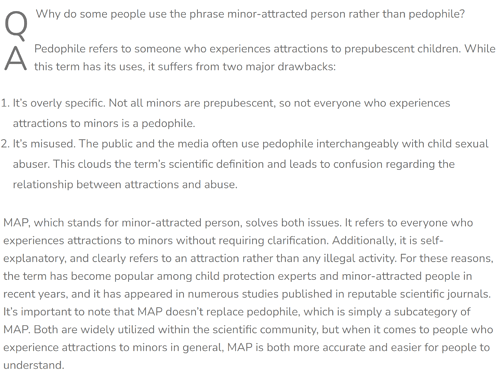Originally published at: https://prostasia.org/blog/4-things-to-know-about-pedophilia/
Editor’s note: To honor indigenous peoples, the author uses a lowercase writing style except when speaking about indigenous rights and issues. For more information, please visit the author’s profile. “child sexual abuse (csa) is possibly one of the only offenses where people collectively “feel the response before they deliberately consider the issue”. this reaction will…
To honor indigenous peoples, the author uses a lowercase writing style except when speaking about indigenous rights and issues.
There’s got to be a better way to do this than deliberately making your articles harder to read.
the term pedophile has been replaced more recently by the term minor attracted person, or map. while descriptively accurate, it does not carry the stigma of the word pedophile.
I’d argue it carries even more stigma now. Anyone who uses it gets accused of “normalizing pedophilia”, whatever that means. I also don’t think it’s meant to replace pedophile, but more so to act as a catch-all to include those who are preferentially attracted to non-prepubescent minors.
I agree. MAP is just an umbrella term to group pedophilia/hebephilia/ephebophilia instead of mislabeling the latter as the former. And yeah, I’d say that the “destigmatization” thing backfired. Like how the term “retarded” replaced the terms “idiot”, “imbecile”, and “moron” (which all used to be medical terms), only for the former to become an arguably worse insult than the latter…
Yeah, while I generally agree with the major points of the post, I took issue with the quote referring to pedophilia as a disorder and the claim that MAP either replaces or destigmatizes pedophile.
Prostasia recently added an FAQ explaining our reasoning behind the term:
I disagree.
Unless there’s a major accommodation issue I’m missing here, this is written and formatted the same as any other informative blog post, with the exception of one cultural difference in grammar. At worst, it’s the text equivalent of “hearing someone with a different English dialect give a lecture”; I’d even argue that, given most dialects have additional vocabulary hurdles (see: “chips vs fries”), this is a much more subtle culture quirk.
Like… it wouldn’t be ethical to ask a person with a Northern Irish dialect to “drop it” for an American audience, yeah? That doesn’t mean it can’t be difficult for some – plenty of people have enough issues processing audio that an accent they’re not familiar with could prevent them from learning anything – but it’s ultimately on the Americans to choose whether they want to sit and listen.
Anyway; I appreciate seeing more posts that can act as an accessible gateway toward discussing legitimately useful CSA prevention. I also appreciate some of the disagreements with both the quote and the terminology definitions.
